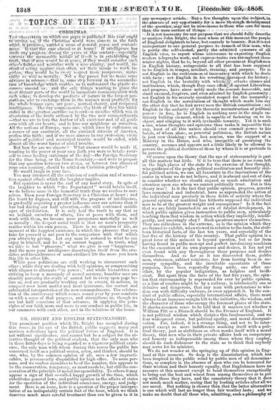eb A to ,: taTICIJ I D- , ir. !Tit trivivc,iii
119.111w
1.2 AL ei
RI i .eoefq Ito g0 . 3aftt anti/ efsnofea dom)14 out ellllismal.. 0,11 'ily[PiOnieeiNk MiAillfeh' our paper i fpnblish-cid this VleaTot.Cgiii eliii4ian world' were sincere in the faitt sJcs, anlidsf a scene of 'general peace and content- Ilhe case abroad or .a:t benne: If intelligence ha. ' Yes┬¦ dtiriiig the years of ŌĆó this century-Lespeeinll IjIP "einorable middlj,. 'of itŌĆöit is in establishing the `fh,rtfitiilen- Would be-at peace, if they would consider each #111 _fliVrtiligy'wotdd be in every respect More prosperous,- mate- ilstlfditle-Sland 'mistakes with a wise charity, ' and would, in- kir 6ting UgaitistŌĆó each other, set their minds to work to- Oft'ilS`liVell as morally. Not a 'elaY passes but we make some ielif ieure,ŌĆöthat is, some step forward in the accumula- t'iorkInbiKedge which enables us to understand the plastic re- Akirtita'arotind' us ; and the only things Wanting to place the lifoitifiStant parts of the world in immediate comnrunicatia with ' Vlivbtit6r' to develop the 'products of nature in the largest pro: klind. to 'exChange them in the manner most profitable for ffiel' deluman race, are peace, mutual charity, and reciprocal ititi4likeneti: - The day commemorates ' the birth of thlt We which ended hi the greatest sacrifice on record--.a sacrifice Which was in dttestation of the truth-enforced be the two new cointuandments ŌĆöthat'ive are to love the Anther of all existence and of all good-, neSS with all our hearts, and to love our neighbour as ourselves. AU the nations of Europe, save One, which lives by sufferance on a iŌĆóOrifer of ŌĆó our -continent, all the civilized citizens of America, Ths:ifbsa this faith : and if we were sincere in our profession every SPidtes of political and municipal trouble would be ended,. with
altiVist all (heWorst forms ' of Social trouble. .
But how far are we sincere ? ŌĆó What' answer would' be made if, trusting in the power of your own faith you Were to betake your- self to some leading statesman of the dayŌĆöthe Foreint 'Secretary for the time being,. or the Home -Secretary,ŌĆöand Were to propose that any question between two states, or between two classes of
your own country, should be settled on Christian principles ? , ŌĆó He would laugh in your face. - You may interpret all the cynicism of confession and of accusa- tion against others which the laughter implies. , ŌĆó
But cynicism is never the end of any moral story. In spite of the laughter to which "the Department" would betake itself, we do believe more in the immortal truth than we confess to our- selves. Even your Foreign Secretary is a Christian at heart ; and the heart by degrees, and still with the progress of intelligence, is gradually .acquiring a greater influence over our actions than it has had during our half education,ŌĆöthe still continued middle ages of civilization. It is only half the truth to say that as we bethink ourselves of others, live at peace with them, and work with them, we become more prosperous materially as well as morally : the deepest social truth is that no man's prosperity resides within his own person. There is no situation of life, no moment of the happiest existence, in which the pleasure that you take for yourself is not poor in the comparison with that which you obtain by giving. Let any man be reduced to what he can enjoy in himself, and he is an outcast beggar. In truth, what we take is but "pleasure," what we give is our "happiness." And the more your intelligence disentangles itself from the cru- dities and incumbrances of semi-civilized life the more you learn this life in other life.
While poor politicians are still working to circumvent each other ; while they are dealing with half opinions, or compromising with cliques to alternate "in power ; " and while hierarchies are striving to keep a monopoly of sacred mystery, humbler men are steadily pursuing the study of sacred law in every open page be- fore us, and are gradually working out in events, in actions, in 'conquest over inert matter and inert ignorance, the correct and substantial interpretation of' the new commandments. The celebra- tion of the anniversary which comes round year by year comforts us with a sense of that progress, and strengthens us, though we are but half conscious of that advance, in applying the prin- ciples of our faith more and more to our conduct in public life, in our commerce with each other, and in the relations of the home.


























 Previous page
Previous page